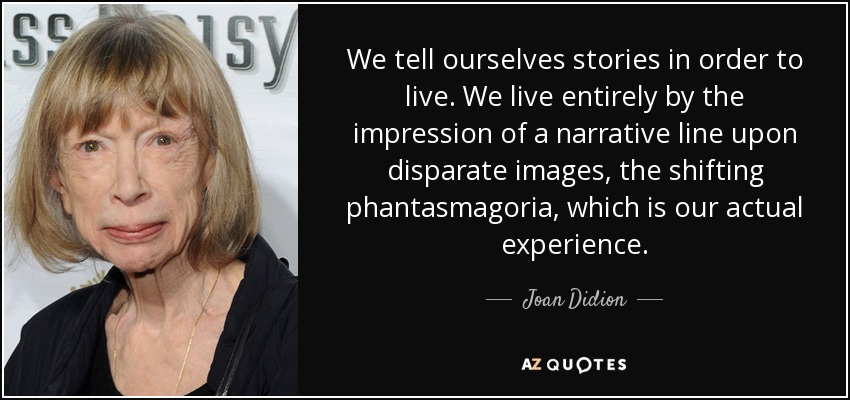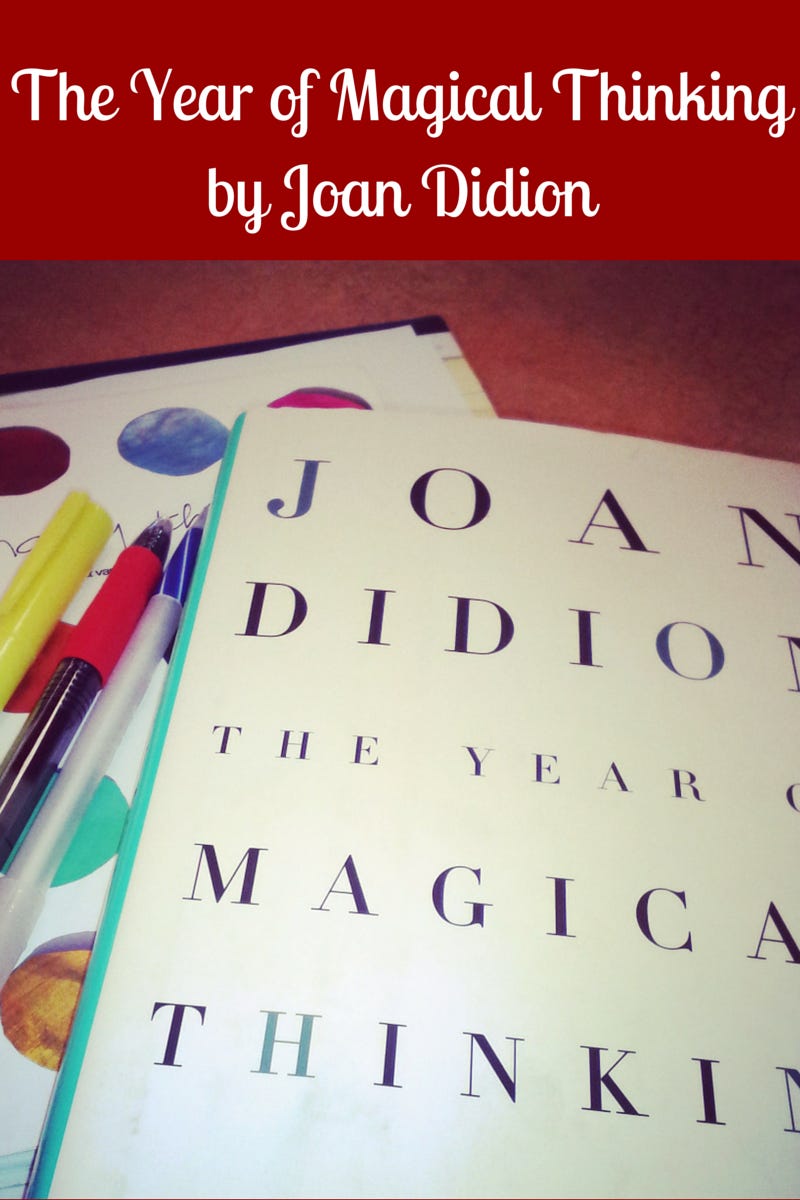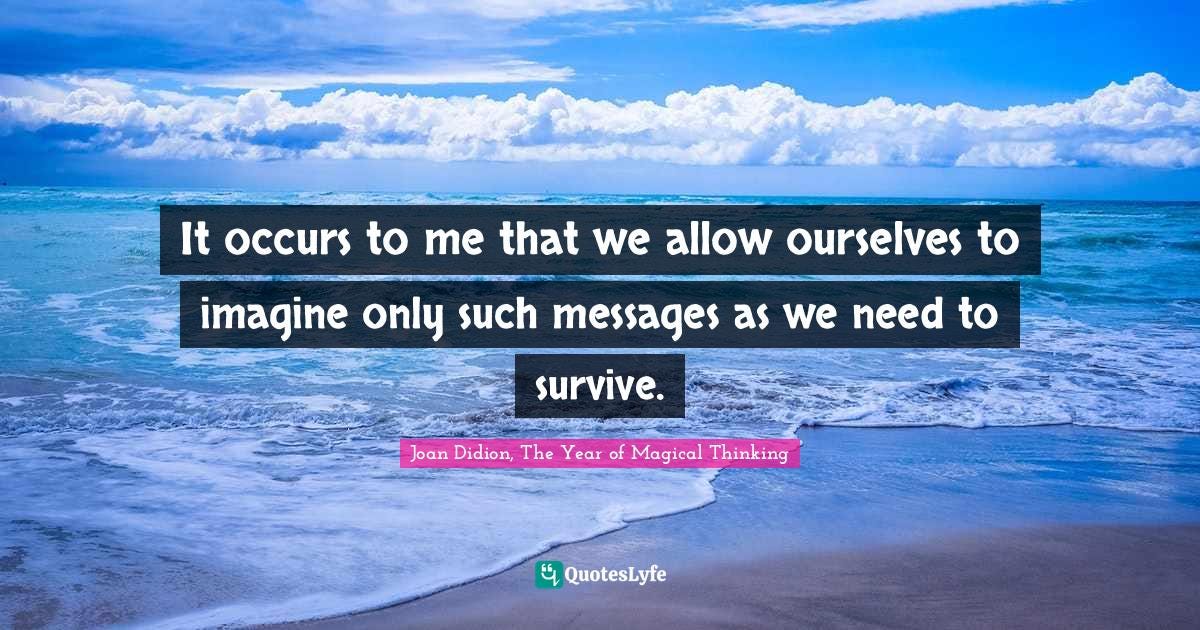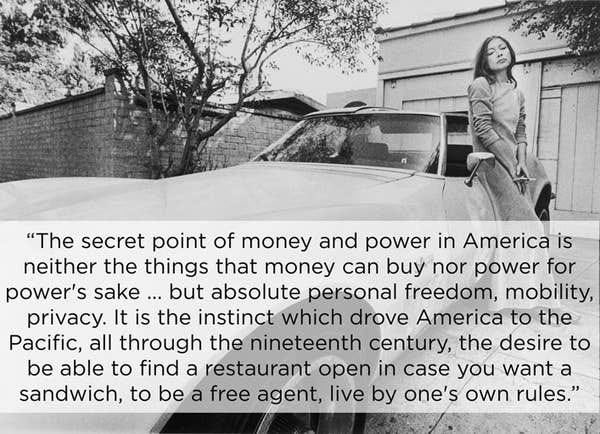Joan Didion's Prescient Insights
from her "Book of Common Prayer" to "Year of Magical Thinking"- inform us during this era of chaos
One of my favorite writers is Joan Didion, whose birthday is on December 5; she died only less than a year ago on December 23 2021 at the age of 87. This newsletter examines her early insights and incisive descriptions of the American psyche, that astutely describe the ‘sleepers’ of this day.
Joan Didion is known for her journalistic essays, in addition to her novels and autobiographical tomes. Her early works chronicled the disorder present in the subjects of her essays, especially the American society, and our responses to it.
“We tell ourselves stories in order to live... We look for the sermon in the suicide, for the social or moral lesson in the murder of five. We interpret what we see, select the most workable of the multiple choices. We live entirely, especially if we are writers, by the imposition of a narrative line upon disparate images, by the "ideas" with which we have learned to freeze the shifting phantasmagoria which is our actual experience.” ― Joan Didion, The White Album
I recently reread Didion's novel, A Book of Common Prayer written in the seventies. It is prescient in its description of what we, today, would call the 'normies' - deluded, hapless, continually compromising, desperately bargaining for any scraps of 'pretend' normalcy. Unfortunately, it took a personal involvement in a violent revolution in a [fictious] Central American country to finally shake awake the story’s protagonist.
A Book of Common Prayer (1977)
The novel is about human dislocation and the intractability of delusion. The plot revolves around Charlotte, who always re-arranges the perceived reality according to what she can bear instead of acknowledging it. It features the breakdown of truth, of meaning.
Excerpts:
“As a child of the western United States she had been provided as well with faith in the value of certain frontiers on which her family had lived, in the virtues of cleared and irrigated land, of high-yield crops, of thrift, industry and the judicial system, of progress and education, and in the generally upward spiral of history.”
"She was immaculate of history, innocent of politics. There were startling vacuums in her store of common knowledge."
"… people take advantage of our desires and we try to rationalize our concessions but usually end up confused and distraught if not dead."
When Charlotte is outraged by the discovery that the revolutionaries have been using crates of cholera vaccine for target practice, the narrator says:
“I think I loved Charlotte in that moment as a parent loves the child who has just fallen from a bicycle, met a pervert, lost a prize, come up in any way against the hardness of the world.
I think I was also angry at her, again like a parent, furious that she hadn't known better, furious that she'd been wrong.”
And when, in the end, Charlotte does fight back:
“You have to pick the places you don’t walk away from.”
In 2005, Didion won the National Book Award for Nonfiction and was a finalist for both the National Book Critics Circle Award and the Pulitzer Prize for The Year of Magical Thinking, her memoir of the year following the death of her husband, writer John Gregory Dunne.
The title of the book refers to magical thinking in the anthropological sense, i.e. thinking that if a person hopes for something enough or performs the right protocols, then an unavoidable event can be averted. Didion realized she was living a ‘delusion’ - she had what we call in psychiatry, full ‘insight’ - but she still clung to it as her way to survive the pain of her grief.
“Grief turns out to be a place none of us know until we reach it. We anticipate (we know) that someone close to us could die, but we do not look beyond the few days or weeks that immediately follow such an imagined death. We misconstrue the nature of even those few days or weeks. We might expect if the death is sudden to feel shock. We do not expect the shock to be obliterative, dislocating to both body and mind. We might expect that we will be prostrate, inconsolable, crazy with loss. We do not expect to be literally crazy, cool customers who believe that their husband is about to return and need his shoes.”
“We are not idealized wild things.
We are imperfect mortal beings, aware of that mortality even as we push it away, failed by our very complication, so wired that when we mourn our losses we also mourn, for better or for worse, ourselves. As we were. As we are no longer. As we will one day not be at all.”
It seems that Didion came full circle near the end of her life - now recognizing the need for the denials, blindness to realities - that she denigrated in her early career. However, she does make the distinction between the self-destructive psychological hiding and the insightfully-aware, temporary, dream state in the face of trauma. Perhaps, that is the lesson to learn here.
“Time is the school in which we learn”
From her writings, other Notable quotes:
"I write entirely to find out what I'm thinking, what I'm looking at, what I see and what it means. What I want and what I fear."
"I no longer want reminders of what was, what got broken, what got lost, what got wasted."
"We forget all too soon the things we thought we could never forget."
"We all survive more than we think we can."
"To free us from the expectations of others, to give us back to ourselves - there lies the great, singular power of self-respect."
I close this newsletter with an important Didion insight, one I hope we will never forget, again.










Lovely!
Thank you!